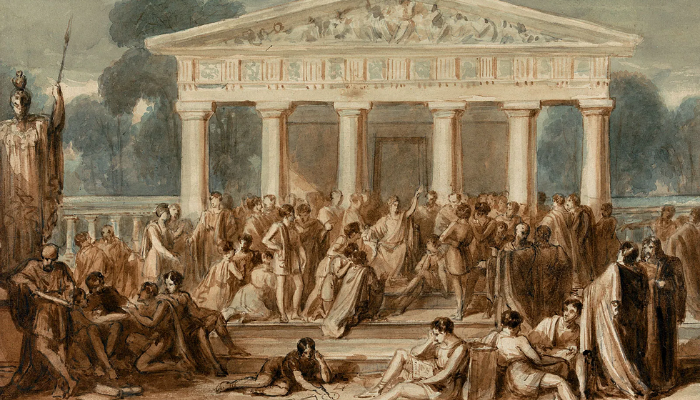1. Introduction
Have you ever wondered what it takes to be remembered for over a thousand years? Hypatia, a brilliant philosopher from ancient Greece, is one of those rare people. She lived in Alexandria, a city known for learning, and became famous for her knowledge in mathematics, astronomy, and philosophy.
Hypatia was different because, at a time when women weren’t encouraged to study, she became one of the most respected teachers in the world. Her wisdom and love for knowledge made her a symbol of learning and curiosity.
In this article, we’ll explore her amazing achievements, why she became so famous, and the tragic way her life ended.
Let’s dive into the story of a remarkable woman who changed history!
2. Hypatia’s Early Life
Hypatia was born around 360 AD in the busy city of Alexandria, Egypt, which was known as a center for learning. Her father, Theon, was a well-known mathematician and philosopher, and he played a big role in her education.
Unlike many girls of her time, Hypatia was encouraged to study and learn about science, math, and philosophy from a young age. She quickly showed she was extremely talented in these subjects.
Hypatia grew up in a world where knowledge was highly valued, and she soon became one of the leading minds of her time. Her early education laid the foundation for her later achievements.
3. Hypatia’s Achievements
Hypatia became one of the most brilliant minds of her era, making significant contributions to mathematics, astronomy, and philosophy.
She improved and expanded upon earlier mathematical works, especially in geometry and algebra. Hypatia also developed important ideas about the movement of the planets and the stars.
As a teacher, she attracted students from all over the Mediterranean, sharing her knowledge and helping to advance science and philosophy. She is credited with writing commentaries on famous works by Ptolemy and Diophantus, further enhancing their understanding. Her achievements made her a respected figure in both the intellectual and scientific communities.
4. Why Was Hypatia So Famous?
Hypatia was famous not just for her intelligence, but for being one of the first well-known female scholars in a male-dominated world. Her ability to teach complex subjects like mathematics, astronomy, and philosophy earned her widespread respect.
She became a symbol of knowledge and reason, admired by students, scholars, and leaders alike. Hypatia’s lectures drew people from all over the world, and her fame spread beyond her hometown of Alexandria.
Her influence extended beyond the classroom, as she was often consulted by political leaders for advice. Hypatia’s brilliance and strong, independent character made her a pioneer for women in science and education.
5. Hypatia’s Tragic Death
Despite her fame, Hypatia’s life ended in tragedy. In 415 AD, she was brutally murdered by a mob in Alexandria. Her death was the result of rising political and religious tensions between Christians and pagans in the city.
Some viewed her as a threat due to her close ties with Orestes, the Roman governor, who opposed the local Christian bishop, Cyril. Hypatia’s philosophical views and irreligious beliefs also made her a target.
The mob, led by Christian zealots, dragged her through the streets and killed her in a violent, public act. Her death marked the end of an era for scholarly learning in Alexandria.
6. Hypatia’s Legacy
Even though her life ended tragically, Hypatia’s legacy continues to shine. She became a symbol of knowledge and wisdom in a world moving toward religious dominance.
Hypatia is remembered as one of the first female mathematicians and philosophers, inspiring countless women and scholars throughout history. Her contributions to astronomy, mathematics, and philosophy covered the way for future intellectuals.
Today, she is often celebrated as a martyr of science, standing for the freedom of thought and the pursuit of truth. Her story has been retold in books, movies, and even in modern feminist movements, making her an iconic figure.
7. Conclusion
Hypatia’s life is a powerful story of intellect, courage, and tragedy. She was not only a remarkable philosopher and mathematician but also a symbol of the pursuit of knowledge in a world where ideas were often challenged.
Despite her untimely death, Hypatia’s contributions to science and philosophy continue to inspire people today. Her life teaches us the importance of critical thinking, curiosity, and standing up for what we believe in, even in the face of adversity.
Hypatia remains a beacon of wisdom, reminding us that the quest for knowledge is timeless and invaluable.
key points about Hypatia:
| Aspect | Details |
|---|---|
| Full Name | Hypatia of Alexandria |
| Birth | Circa 355 – 370 AD, Alexandria, Egypt |
| Death | 415 AD, Alexandria, Egypt |
| Profession | Philosopher, Mathematician, Astronomer |
| Famous For | Teaching philosophy and mathematics, writing important works, and advancing Neoplatonism |
| Key Achievements | – Leading the Neoplatonic school in Alexandria – Contributions to mathematics and astronomy |
| Philosophy | Neoplatonism, a blend of Plato’s ideas with other philosophical teachings |
| Tragic Death | Killed by a mob in 415 AD due to rising tensions between religious and political groups in Alexandria |
| Legacy | Symbol of intellectual freedom, critical thinking, and women’s contributions to science |

